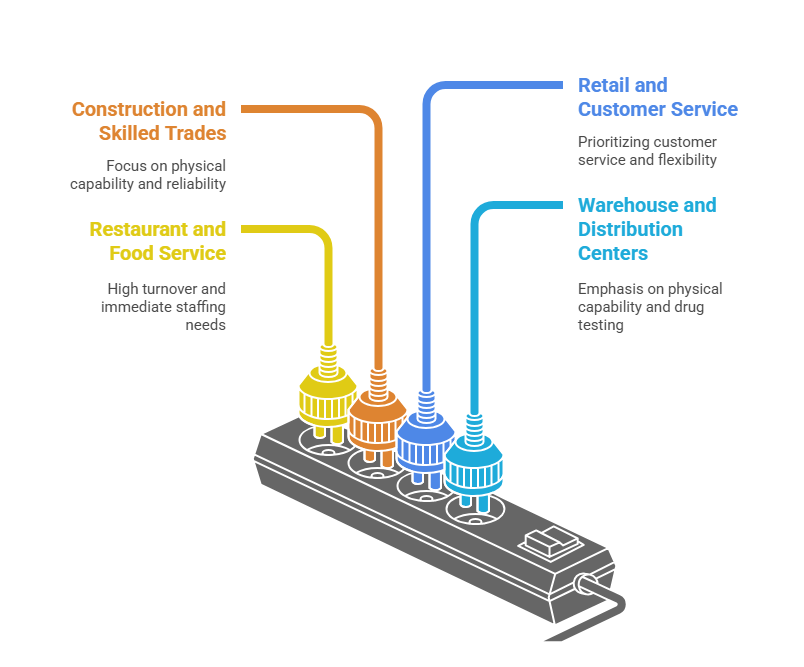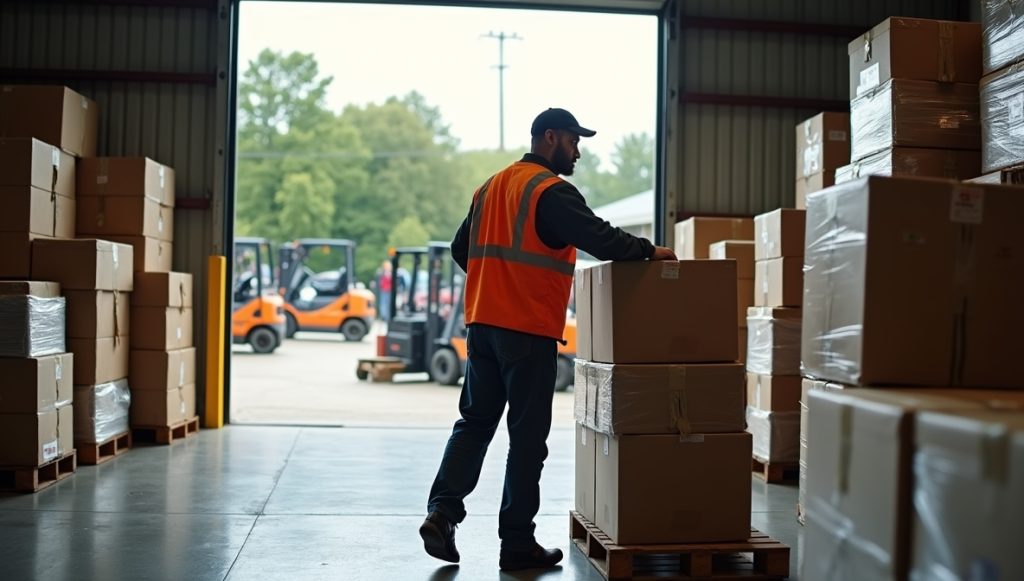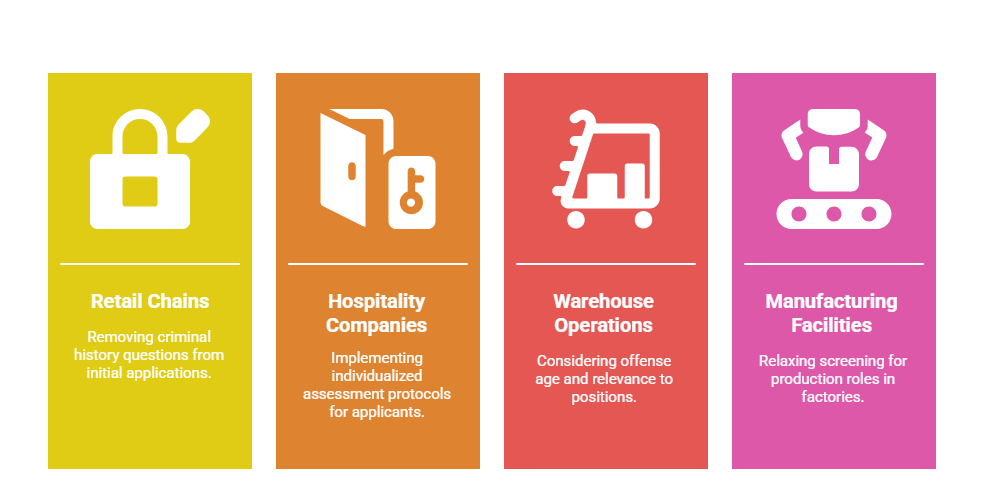Virginia's job market offers numerous opportunities for individuals seeking employment without extensive background screening. However, the state's significant federal contractor presence in Northern Virginia creates unique challenges. Understanding which industries prioritize immediate hiring over comprehensive vetting can significantly expand job opportunities for those with criminal records or complex employment histories.
Key Takeaways
- Virginia's concentration of federal contractors, especially in Northern Virginia, means many positions require background checks due to security clearances and government regulations.
- Small businesses, restaurants, retail stores, and construction companies frequently hire without formal background checks, particularly for entry-level positions.
- Gig economy platforms like rideshare, food delivery, and TaskRabbit operate in Virginia but may still conduct limited background screenings for safety purposes.
- Virginia law doesn't prohibit employers from conducting background checks, but "ban-the-box" policies exist for state government positions.
- The tech sector in Northern Virginia increasingly offers opportunities through skills-based hiring, though larger companies typically maintain screening protocols.
- Cash-based businesses, including landscaping, house cleaning, and independent contracting, often provide immediate employment without formal vetting.
- Seasonal and temporary positions through staffing agencies may have reduced screening requirements compared to direct-hire roles.
- Virginia's second chance employment programs and fair chance hiring initiatives are expanding across Richmond, Norfolk, and other major cities.
- Understanding the difference between criminal background checks, employment verification, and credit checks helps candidates identify genuinely accessible opportunities.
Understanding Background Check Requirements in Virginia
Virginia operates under at-will employment laws. This means employers generally have broad discretion in their hiring practices. They can decide whether to conduct background checks on their own terms.
Unlike some states with comprehensive fair chance hiring legislation, Virginia's regulations focus on specific industries. State government positions follow certain rules. However, private employers maintain significant latitude in establishing their own screening policies.
The state's unique position creates additional complexity. Virginia is home to numerous federal agencies, defense contractors, and government suppliers. Background screening is more prevalent here than in many other states. The Virginia Department of Criminal Justice Services regulates certain aspects of background checks. This particularly affects positions involving vulnerable populations or security-sensitive roles.
Federal Contractor Impact on Virginia Employment
Northern Virginia's economy heavily depends on federal contracting. Companies in Arlington, Alexandria, Fairfax, and surrounding areas serve government clients. These positions almost universally require background checks, security clearances, or both.
The Washington D.C. metro area's job market differs substantially from other regions. Richmond, Virginia Beach, and rural communities have minimal federal contractor presence. This makes them potentially more accessible for individuals seeking employment without background checks. Southern and Western Virginia offer more opportunities in this regard.
Even non-security positions at federal contractors often require basic background screening. This is due to facility access requirements. Job seekers should recognize this reality when planning their search strategy.
Virginia's Regional Employment Differences
The job market varies significantly across Virginia's different regions. Northern Virginia's federal contractor concentration creates higher screening rates. Meanwhile, Hampton Roads, Richmond, and rural areas offer more accessible opportunities.
Tourist destinations like Virginia Beach and Shenandoah Valley have seasonal positions. These often involve minimal vetting processes. Urban centers provide diverse options across multiple industries. Smaller communities frequently feature family-owned businesses with informal hiring practices.
Understanding these regional differences helps candidates target their job search effectively. Location choice can significantly impact employment accessibility. Therefore, considering relocation within Virginia might expand opportunities.
Industries and Jobs With Minimal Background Screening
Several employment sectors in Virginia traditionally hire quickly without extensive background verification. These industries experience high turnover, seasonal demand fluctuations, or operate in cash-based environments. Formal screening processes are less common in these sectors. Understanding which sectors prioritize speed-to-hire helps candidates target their job search effectively.

The following industries represent the most accessible opportunities for Virginia job seekers. While individual company policies vary, these sectors historically maintain less rigorous screening protocols. Small businesses and independent operators particularly offer immediate start opportunities.
Restaurant and Food Service Positions
Virginia's robust hospitality industry employs hundreds of thousands of workers. Small restaurants, family-owned establishments, and independent eateries frequently hire without formal background checks. They need servers, cooks, dishwashers, and food prep workers immediately.
The industry's high turnover rate drives this approach. Managers prioritize availability and basic food safety certification over extensive screening. Chain restaurants may implement corporate screening policies. However, locally-owned establishments typically conduct only basic employment verification.
Popular tourist areas offer seasonal opportunities with minimal vetting. Virginia Beach, Colonial Williamsburg, and Shenandoah Valley destinations need workers year-round. Tips-based positions provide immediate income potential. Back-of-house roles offer stable hourly wages without customer-facing requirements.
Construction and Skilled Trades

Virginia's construction industry spans residential development, commercial projects, and infrastructure improvement. Small to mid-sized construction companies often hire laborers without formal background checks. Independent contractors and specialty trade businesses follow similar practices. The industry focuses on physical capability, reliability, and willingness to work outdoors.
| Trade Sector | Typical Screening | Entry Requirements |
| Residential Construction | Minimal to none | Physical ability, transportation |
| Landscaping/Lawn Care | Rarely conducted | Valid driver's license preferred |
| Roofing/Siding | Seldom required | Comfort with heights, stamina |
| Painting/Drywall | Uncommon | Basic tool knowledge helpful |
| Moving/Hauling Services | Varies by company | Lifting capability, clean driving record |
Independent contractors and small crews particularly offer immediate start opportunities. Payment is often provided weekly or upon project completion. The construction sector's cash-based nature means less formal hiring documentation.
Retail and Customer Service Opportunities
Small retail stores throughout Virginia frequently hire without background checks. Convenience shops and local businesses prioritize availability over extensive screening. This especially applies to part-time or temporary positions.
Major retailers typically implement corporate screening policies. However, independent shops and family businesses take a different approach. They prioritize customer service skills and scheduling flexibility. The retail sector's immediate training needs make it accessible for diverse candidates.
Positions in stock rooms and warehouse assistance have even fewer screening requirements. These roles involve less customer interaction. Virginia's numerous shopping districts offer concentrated retail opportunities. Seasonal hiring around holidays provides additional entry points with reduced screening protocols.
Warehouse and Distribution Centers

Virginia's strategic East Coast location supports numerous warehousing operations. Distribution centers need package handlers, forklift operators, and inventory workers regularly. Some large warehousing companies conduct background checks, but many smaller operations do not.
Third-party logistics companies and regional distributors often prioritize immediate staffing. They need workers who can pass drug tests and demonstrate physical capability. Background screening varies widely by company size and client requirements. Independent warehouses typically maintain less formal hiring processes than national chains.
The Port of Virginia's operations create additional warehousing opportunities. The Richmond and Hampton Roads areas have particularly strong warehouse sectors. Night shift positions often have less competition and potentially fewer screening requirements.
Gig Economy and Flexible Work Options
The gig economy has expanded significantly across Virginia's urban and suburban areas. App-based platforms and independent contracting offer flexible earning opportunities. However, many platforms conduct some form of background screening for safety and liability reasons.
The requirements and intensity vary considerably between platforms. Understanding which platforms maintain minimal screening helps candidates identify viable opportunities. Virginia's major metropolitan areas offer the most robust gig economy options.
Food Delivery Services
Food delivery platforms operate extensively throughout Virginia's cities and suburbs. DoorDash, Uber Eats, and similar services conduct background checks. However, they focus primarily on driving records and criminal history related to violence or theft.
The screening process is typically less extensive than traditional employment verification. Many individuals with older offenses or non-violent records successfully participate. Bicycle and scooter delivery options in urban areas may have reduced screening requirements. Arlington and Richmond offer these alternative delivery methods.
The immediate onboarding process makes food delivery accessible. Flexible scheduling allows workers to start earning quickly. Earnings depend on location, time commitment, and platform algorithms. Northern Virginia markets generally offer higher order volume and compensation.
Freelance and Independent Services
TaskRabbit, Handy, and similar platforms connect service providers with customers. These platforms help people with moving, furniture assembly, cleaning, and handyman tasks. Background checks are conducted but may approve candidates whom traditional employers would reject.
- Moving and heavy lifting assistance
- Furniture assembly and installation
- Home organization and decluttering
- Basic repairs and maintenance
- Yard work and outdoor projects
Building a strong profile through completed tasks matters significantly. Positive reviews create alternative credibility pathways beyond formal employment history. The approval timeline usually takes 5-10 business days after application submission. Income potential ranges from $20-60 per hour depending on task complexity.
Rideshare and Transportation Services

Uber and Lyft operate throughout Virginia but maintain relatively strict background check policies. These checks include driving record review and criminal history screening. Background checks typically extend seven years for criminal history and three years for driving records.
These platforms are not as accessible as some other gig options. Individuals with recent records face more challenges. However, those with older offenses or clean histories find rideshare driving viable. Northern Virginia's dense suburban corridors offer particularly lucrative opportunities.
Alternative transportation services provide other options. Medical transport for non-emergency situations may have different requirements. Local delivery services sometimes maintain less strict screening. The key is distinguishing between passenger transportation and goods delivery.
Cash-Based and Informal Employment
Virginia's economy includes substantial cash-based work opportunities. Formal hiring processes, documentation, and background checks are uncommon in these sectors. These positions range from completely informal arrangements to legitimate small businesses. The businesses simply lack the infrastructure for comprehensive screening.
While these opportunities provide immediate income, workers should understand the tradeoffs. Legal protections, benefits, and long-term career development may be limited. Nevertheless, these jobs offer economic participation for individuals facing employment barriers.
Landscaping and Lawn Care Services
Virginia's four-season climate creates year-round demand for outdoor services. Small landscaping companies and independent operators frequently hire helpers without formal background checks. They need crew members and laborers immediately. The work is physically demanding but offers immediate starts.
Payment schedules are often same-week or even daily. Spring through fall represents peak season for landscaping work. Winter work includes leaf removal, storm cleanup, and preparation services. Snow removal during winter months provides additional income opportunities.
Neighborhoods throughout Virginia's suburbs support numerous small landscaping businesses. Fairfax County and Chesterfield County have particularly strong markets. Starting positions typically pay $12-18 per hour. Experienced workers can earn $20 or more hourly.
House Cleaning and Domestic Services

Professional house cleaning services throughout Virginia routinely hire without background checks. Individual cleaners also operate independently. This especially applies to residential clients rather than commercial contracts. The industry includes both formal cleaning companies and independent contractors.
| Service Type | Typical Pay Rate | Common Arrangement |
| Individual home cleaning | $15-25/hour | Cash or check payment, weekly/biweekly |
| Move-in/move-out cleaning | $150-400/job | Per-project payment |
| Regular maintenance cleaning | $80-150/visit | Recurring client relationships |
Trustworthiness is established through references and work quality. Formal screening rarely enters the equation. Building a client base through excellent service creates sustainable income streams. Many successful cleaners start with a few clients and expand through referrals.
Farm and Agricultural Work
Virginia's agricultural sector includes farms, nurseries, orchards, and agribusinesses. Shenandoah Valley, Southside Virginia, and rural communities offer these opportunities. Seasonal agricultural work typically involves minimal screening. Hiring is based on physical capability and availability.
Apple orchards, produce farms, and Christmas tree farms need workers regularly. Planting, maintenance, and harvest seasons create peak demand. Nurseries require year-round staff for various tasks. Farm work provides legitimate employment with immediate starts.
The work is physically demanding and often seasonal. However, it offers entry without employment barriers. Many agricultural employers provide housing or transportation assistance. This particularly applies during peak seasons. Wages range from minimum wage to $15 or more hourly.
Northern Virginia Tech Sector Opportunities
Northern Virginia's technology industry has grown substantially in recent years. Data centers, cybersecurity firms, software companies, and tech startups concentrate in several counties. Loudoun, Fairfax, and Arlington counties lead this growth. The region's proximity to federal agencies means many tech positions require clearances.
However, an emerging segment focuses on skills-based hiring. These companies reduce their emphasis on background verification. Understanding which companies and roles prioritize demonstrated abilities helps candidates. The tech industry's talent shortage drives this shift.
Skills-Based Hiring Initiatives
Several Northern Virginia tech companies have adopted skills-based hiring frameworks. These prioritize demonstrated technical competencies over traditional credentials. Portfolios, coding challenges, and project work matter more than background checks. Apprenticeship programs and coding bootcamp partnerships sometimes reduce or eliminate background screening.
Companies focused on social impact maintain more flexible policies. Second chance employment initiatives exist in some organizations. Innovative talent acquisition strategies open doors for more candidates. Tech positions least likely to require extensive background checks include specific roles.
Front-end development roles without client data access are more accessible. Quality assurance testing positions often have reduced requirements. Technical support for non-sensitive applications follows similar patterns. Content management positions typically involve less screening.
Building a strong GitHub portfolio shifts hiring focus significantly. Contributing to open-source projects demonstrates capability. Completing demonstrable projects proves technical skills. These accomplishments matter more than employment history in skills-based hiring environments.
Startup and Small Tech Company Culture
Northern Virginia's startup ecosystem includes emerging companies with different approaches. These organizations often lack formal HR infrastructure. Some maintain intentionally minimal bureaucracy. Smaller organizations often conduct basic reference checks rather than comprehensive background screening.
Tech startups in Arlington's innovation corridor offer opportunities. Alexandria's emerging tech district follows similar patterns. These companies prioritize hiring speed and cultural fit. Extensive vetting takes a back seat to immediate needs.
Networking through tech meetups helps candidates connect with hiring managers. Hackathons and community coding events create direct relationships. Personal connections and demonstrated skills often outweigh formal screening. When startups need immediate technical talent, relationships matter significantly. The trade-off includes potentially lower salaries and less stability.
Virginia Companies Embracing Second Chance Hiring
A growing number of Virginia employers have formalized second chance employment programs. Fair chance hiring policies limit background check scope. Some delay screening until later in the hiring process. Others focus on the job-relatedness of any discovered offenses.
These initiatives reflect corporate social responsibility commitments. They also represent practical responses to labor shortages. Major cities including Richmond, Norfolk, and Virginia Beach have seen increased advocacy. Some municipalities implement policies for government contractors.
Major Employers With Fair Chance Policies
National retailers operating in Virginia increasingly advertise fair chance commitments. Hospitality chains and service companies follow similar approaches. They use individualized assessment of criminal records rather than blanket exclusions. Companies evaluate candidates based on the nature of any offense, time elapsed, and job relevance.
Some employers delay background checks until after conditional job offers. This allows candidates to demonstrate qualifications first. Dave's Hot Chicken and Honest Jobs partner employers lead in this area. Businesses participating in fair chance hiring initiatives evaluate each candidate individually.

- Retail chains removing criminal history questions from initial applications
- Hospitality companies implementing individualized assessment protocols
- Warehouse operations considering offense age and relevance to positions
- Manufacturing facilities relaxing screening for production roles
Researching company fair chance policies before applying helps significantly. Preparing to discuss any background issues professionally creates better outcomes. Virginia's competitive labor market incentivizes employer flexibility in screening policies.
State and Local Government Positions
The Virginia state government implemented limitations on criminal history inquiries. Arrests that didn't lead to conviction cannot be used against applicants. Convictions require individualized assessment protocols. State agency positions may still conduct background checks but must follow specific rules.
Job-relatedness and consideration of mitigating factors are required. Local governments in Richmond and Alexandria have adopted various "ban-the-box" measures. These apply to city employment and sometimes extend to contractors. Other municipalities follow similar approaches to varying degrees.
Government positions offer stable employment and comprehensive benefits. Career advancement opportunities often surpass private sector jobs without background checks. Entry-level parks and recreation positions typically have less stringent requirements. Public works and administrative support positions follow similar patterns.
Navigating Drug Testing Requirements
Beyond criminal background checks, drug testing represents another screening concern. Drug testing policies vary significantly by industry and company size. Job responsibilities also influence testing requirements. Virginia law doesn't prohibit workplace drug testing.
Employers must follow consistent policies and typically notify candidates. Understanding which industries and positions rarely require drug testing helps candidates. This knowledge helps avoid unnecessary obstacles during the job search.
Industries That Rarely Test
Companies that commonly avoid drug testing include specific business types. Small businesses often lack formalized HR processes for testing. Retail and hospitality establishments frequently skip this step. Creative agencies and marketing firms maintain progressive policies in many cases.
- Small independent businesses without formal HR departments
- Creative agencies and design firms with flexible cultures
- Retail establishments hiring for customer service roles
- Administrative positions in non-regulated industries
- Sales jobs outside heavily regulated sectors
Positions least likely to require testing share certain characteristics. Remote work arrangements often skip drug testing entirely. Creative and design roles typically maintain fewer restrictions. Administrative support positions in small companies rarely test. Sales jobs in certain industries follow similar patterns.
How to Research Company Testing Policies
Job seekers can determine drug testing policies through several methods. Carefully reviewing job postings for testing mentions is the first step. Many companies disclose testing requirements in job descriptions. Employee review sites provide additional insights.
Asking directly during the application process works after demonstrating qualifications. Research company policies through Indeed and Glassdoor employee reviews. Networking with current or former employees provides valuable information. Being straightforward about questions regarding testing is generally better than surprises later.
Federal contractors, healthcare providers, and transportation companies typically maintain comprehensive testing programs. Manufacturing operations follow similar protocols. Understanding these patterns helps candidates avoid wasting time on incompatible opportunities.
Legal Considerations and Worker Rights
Virginia job seekers should understand their legal rights regarding background checks. Employment screening is governed by federal and state laws. The federal Fair Credit Reporting Act (FCRA) establishes important protections. This law governs how employers use background check reports.
FCRA requires disclosure, consent, and specific adverse action procedures. Virginia law provides additional protections in specific contexts. Discrimination based on protected characteristics is prohibited. Understanding these rights prevents exploitation and recognizes when employers violate requirements.
FCRA Requirements and Protections
When employers use third-party background check companies, specific rules apply. Consumer reporting agencies fall under FCRA regulations. Employers must provide clear disclosure before screening. Written consent is required from candidates.
If background check results lead to adverse employment decisions, employers must follow notification procedures. Candidates receive the opportunity to review reports and dispute inaccuracies. These requirements apply regardless of what screening discovers. Important protection pathways exist for workers.
Workers who discover inaccurate background check information have dispute rights. Both the screening company and information sources must address disputes. The Virginia Attorney General's office handles FCRA violations. The Consumer Financial Protection Bureau also addresses these issues.
Virginia Employment Discrimination Laws
Virginia's Human Rights Act prohibits employment discrimination based on specific characteristics. Protected categories include race, color, religion, and national origin. Sex, pregnancy, childbirth, age, and marital status are protected. Disability and veteran status also receive protection.
Criminal history isn't a protected characteristic under Virginia law. However, using background checks in discriminatory ways can be illegal. Policies that disproportionately affect protected groups without legitimate justification face challenges. Employers must ensure screening policies don't illegally discriminate.
Blanket policies excluding all candidates with any criminal history may face legal challenges. This particularly applies when policies disproportionately affect protected groups. Workers who believe they've experienced discriminatory background check practices can file complaints. The Virginia Division of Human Rights and Equal Employment Opportunity Commission handle these cases.
Strategies for Job Searching Without Background Checks
Successfully securing employment without background checks requires strategic approaches. Simply identifying potentially accessible employers isn't enough. Candidates should develop targeted job search methods and prepare compelling narratives. Building professional networks creates opportunities outside traditional screening processes.
Virginia's diverse regional economies require tailored approaches. Strategies effective in Northern Virginia's competitive market differ from smaller communities. Rural areas need different approaches than urban centers. Flexibility and persistence remain essential across all contexts.
Networking and Direct Connections
Personal and professional networking often circumvents formal background check processes. Trust-based hiring relationships develop through connections. Attending industry events builds relationships with potential employers. Joining professional associations creates networking opportunities.
Volunteering with community organizations demonstrates reliability and work ethic. Participating in workforce development programs provides employer connections. When hiring managers know candidates personally, formal screening becomes less critical. Trusted referrals carry significant weight in hiring decisions.
Virginia's workforce development boards provide networking opportunities. American Job Centers offer direct employer connections. Nonprofit employment services throughout the state support job seekers. Faith-based organizations and reentry programs connect candidates with employers.
Community development corporations in Richmond, Norfolk, and Hampton offer programs. These organizations provide job readiness training with employer partnerships. Connections frequently result in employment without traditional barriers. Building these relationships takes time but produces significant results.
Emphasizing Skills and Value Proposition
Shifting employer focus from background to capabilities requires demonstrating concrete skills. Creating portfolios showcasing work samples proves abilities. Obtaining industry certifications validates knowledge and commitment. Completing apprenticeships provides hands-on experience and credentials.
Developing measurable accomplishments provides tangible evidence of qualifications. For many employers, demonstrated capability outweighs background concerns. When candidates prove they can perform required duties, past issues become less important. Forward-looking capability matters more than backward-looking screening.
Virginia's community colleges offer affordable certification programs. Healthcare, technology, skilled trades, and business programs are available. Workforce development programs provide free training in high-demand sectors. These credentials shift hiring conversations toward future potential.
| Credential Type | Typical Duration | Cost Range | Impact on Hiring |
| Community College Certificate | 6-18 months | $1,000-5,000 | High - demonstrates commitment |
| Industry Certification | 2-6 months | $200-2,000 | Moderate to High - validates skills |
| Apprenticeship Program | 1-4 years | Often paid training | Very High - combines education and experience |
| Workforce Development Training | 2-12 weeks | Free or low-cost | Moderate - provides job-ready skills |
These credentials create conversation starters during interviews. They demonstrate initiative and capability. Employers focus on what candidates can do rather than past challenges.
Leveraging Temporary and Seasonal Work
Temporary and seasonal positions provide entry points into companies. These roles often have reduced screening requirements compared to permanent positions. Demonstrating value during temporary assignments can lead to direct hire offers. By this point, employers already know the candidate's capabilities.
Seasonal work in retail, hospitality, and agriculture provides immediate opportunities. Holiday hiring creates numerous accessible positions. Proving reliability during busy seasons often results in permanent offers. Companies prefer hiring known quantities over screening new candidates.
Staffing agencies place workers in temporary positions across industries. Some agencies conduct minimal background screening for certain roles. Building relationships with agency recruiters creates ongoing opportunities. Consistent performance leads to better assignments and potential permanent placements.
Resources and Support Services in Virginia
Virginia offers numerous resources supporting job seekers facing employment barriers. State agencies provide comprehensive services. Nonprofit organizations offer specialized support. Workforce development programs connect candidates with training and employers.
Reentry services help individuals with criminal records navigate unique challenges. Leveraging these resources significantly improves employment outcomes. Many services are free or low-cost. Government programs and charitable organizations fund these initiatives.
Virginia Career Works Centers
Virginia Career Works centers operate throughout the state. These American Job Centers provide comprehensive employment services. Job search assistance helps candidates identify opportunities and apply effectively. Resume development services create professional application materials.
Interview preparation builds confidence and skills. Skills training referrals connect job seekers with educational programs. Centers offer access to computers, job boards, and professional staff. Support is available to all job seekers regardless of background.
Services are completely free to use. Centers exist in communities across Virginia. Major cities and rural counties both have access. Staff understand local job markets and employer needs. They can connect candidates with positions matching their situations.
Reentry and Second Chance Programs
The Department of Corrections' reentry programs support individuals leaving incarceration. Community-based organizations provide specialized assistance. Goodwill Industries offers comprehensive employment services across Virginia. The Salvation Army operates programs in multiple cities.
Local reentry coalitions connect individuals with resources. These programs understand employment barriers facing people with records. They maintain employer relationships specifically welcoming second chance candidates. Specialized support addresses unique challenges these job seekers face.
Legal aid organizations throughout Virginia assist with record-related issues. Expungement services help clear eligible offenses. Sealing services limit public access to certain records. Understanding how criminal history affects employment rights empowers candidates. Attorneys provide guidance on disclosure requirements and rights.
Industry-Specific Training Programs
Virginia's community college system offers workforce training across numerous industries. Healthcare certifications prepare candidates for medical assistant and nursing positions. Technology boot camps teach in-demand programming and IT skills. Skilled trades programs cover construction, electrical, plumbing, and HVAC.
These programs often include job placement assistance. Employer partnerships create direct hiring pipelines. Completing recognized training programs shifts employer focus to skills. Past background issues become less relevant when candidates demonstrate current capabilities.
Apprenticeship programs combine paid work with structured training. Virginia registered apprenticeships exist in construction, technology, and healthcare. These programs provide income while building credentials. Completion rates for apprenticeships lead to strong employment outcomes. Employers invest in apprentices and rarely conduct extensive screening before acceptance.
Conclusion
Virginia's job market presents both unique challenges and significant opportunities. The state's concentration of federal contractors creates obstacles, particularly in Northern Virginia. However, numerous accessible pathways exist across industries and regions. Small businesses, service industries, construction trades, and gig economy platforms offer viable options. Emerging second chance hiring initiatives expand possibilities further. By strategically targeting accessible opportunities and leveraging support resources, Virginia job seekers can successfully navigate employment barriers. Building professional networks and emphasizing demonstrated capabilities creates sustainable career paths. The key is understanding where opportunities exist and approaching the job search with informed strategy.
Frequently Asked Questions
What industries in Virginia are most likely to hire without background checks?
Restaurant and food service, construction and skilled trades, landscaping, retail in small independent stores, and house cleaning services typically involve minimal screening. These industries prioritize immediate availability and basic job skills over formal employment verification. Agricultural work and cash-based businesses also frequently hire without background checks.
Does Virginia have "ban-the-box" laws requiring employers to delay criminal history questions?
Virginia has implemented "ban-the-box" policies for state government employment, removing criminal history questions from initial applications. However, no statewide law mandates this for private employers. Some localities have enacted fair chance hiring policies for government contractors and city employees.
Can employers in Virginia see arrests that didn't result in convictions?
Virginia law limits state agencies from asking about arrests without convictions, but private employers have more flexibility. Under federal FCRA regulations, consumer reporting agencies can report arrests without conviction for seven years. Virginia employers should focus on convictions relevant to job responsibilities.
Do gig economy platforms like Uber and DoorDash conduct background checks in Virginia?
Yes, most gig platforms conduct some form of background screening, though requirements vary. Rideshare services perform more comprehensive checks including criminal history and driving records. Food delivery platforms typically conduct limited screenings focusing on violent offenses and theft.
Are there Virginia tech companies that hire based on skills rather than background checks?
Northern Virginia's tech sector includes some startups and companies adopting skills-based hiring that prioritizes demonstrated abilities. These opportunities are more common in smaller companies, apprenticeship programs, and roles not involving sensitive government data. Building strong portfolios and technical projects helps access these positions.
What types of background checks do federal contractors in Virginia require?
Federal contractors typically require criminal background checks and may need security clearances depending on contract requirements. Even non-security positions often require basic screening due to facility access needs. This makes opportunities outside the federal contracting sector more accessible.
Can Virginia employers refuse to hire based solely on criminal history?
Virginia employers generally have broad discretion to make hiring decisions based on criminal history. However, they must avoid policies that illegally discriminate against protected groups. Growing fair chance hiring advocacy encourages individualized assessment considering offense nature, time elapsed, and job relevance.
Where can job seekers in Virginia find support services for employment with criminal records?
Virginia Career Works centers throughout the state provide free employment services to all job seekers. Organizations like Goodwill Industries, The Salvation Army, and local reentry coalitions offer specialized support. Department of Corrections reentry programs provide employer connections and job training.
Do small businesses in Virginia typically conduct background checks?
Small businesses often lack the resources and infrastructure for formal background screening. Family-owned restaurants, independent retail stores, and small construction companies frequently hire based on interviews and references. Individual policies vary significantly, but small businesses generally maintain less formal screening processes.
How can someone find out if a Virginia company conducts background checks before applying?
Job postings sometimes mention background check requirements directly. Research company policies through employee review sites like Indeed and Glassdoor. Call HR departments with general policy questions before applying, or ask during interviews after establishing qualifications. Networking with current or former employees provides valuable insights.
Additional Resources
- Virginia Career Works - Statewide Employment Services
https://www.vcw.virginia.gov/ - Virginia Department of Corrections - Reentry and Employment Programs
https://vadoc.virginia.gov/offenders/reentry/ - Legal Aid Justice Center - Employment Rights and Record Expungement
https://www.justice4all.org/ - Virginia Human Rights Act - Employment Discrimination Information
https://law.lis.virginia.gov/vacode/title2.2/chapter39/ - Consumer Financial Protection Bureau - Background Check Rights Under FCRA
https://www.consumerfinance.gov/consumer-tools/background-checks/ - National Hire Network - Fair Chance Hiring Resources
https://www.hirenetwork.org/
Still have questions?
Get in touch with our team today for a personalized demo and discover how our tailored volume pricing and packages can drive results for your business!
How useful was this page?*
Note: your comments are anonymous. We use them to improve the website. Do not include any personal details.
Visit our FCRA Compliance Tool or leave a message here if you need a response.
From the blog Explore the GCheck Content Hub

How Long Does a Background Check Take? A Complete 2025 Guide
13 Dec, 2023 • 14 min read
The Ultimate Background Check Guide
13 Dec, 2023 • 4 min read
The Ultimate Guide to Employment Background Checks
13 Dec, 2023 • 10 min readThe information provided in this article is for general informational and educational purposes only and should not be construed as legal advice or a substitute for consultation with qualified legal counsel. While we strive to ensure accuracy, employment screening laws and regulations—including but not limited to the Fair Credit Reporting Act (FCRA), Equal Employment Opportunity Commission (EEOC) guidelines, state and local ban-the-box laws, industry-specific requirements, and other applicable federal, state, and local statutes—are subject to frequent changes, varying interpretations, and jurisdiction-specific applications that may affect their implementation in your organization. Employers and screening decision-makers are solely responsible for ensuring their background check policies, procedures, and practices comply with all applicable laws and regulations relevant to their specific industry, location, and circumstances. We strongly recommend consulting with qualified employment law attorneys and compliance professionals before making hiring, tenant screening, or other decisions based on background check information.

